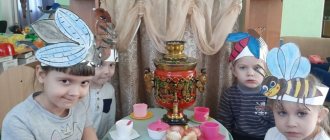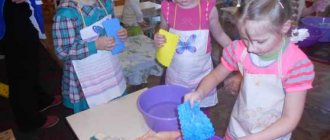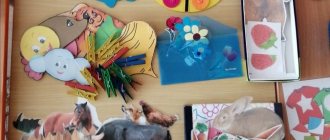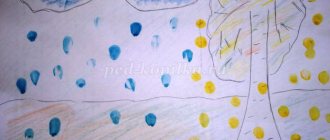Methodical manual “Developmental activities for the nursery group.”
Natalia Syomina
Methodical manual “Developmental activities for the nursery group.”
What childhood age requires the greatest attention in terms of the opportunities provided to accelerate the child’s mental development , the use or non-use of which can have serious consequences? From a psychological and pedagogical point of view, this is early childhood age from one to three years. This age is one of the key ones in a child’s life and largely determines his future psychological development . The special significance of this age is explained by the fact that it is directly related to the three fundamental life acquisitions of a child: upright posture, verbal communication and objective activity. But the main thing is that at this age the child masters a skill that significantly affects his subsequent behavioral, intellectual and personal development , namely, the ability to understand and actively use language in communication with people. Through the speech that the child masters during these years, he gains direct access to the most important achievements of human material and spiritual culture. And the process of development is integrally connected with the development of fine motor skills of the hand. By developing fine motor skills of the hands , we simultaneously have a beneficial effect on the development of the child's intelligence . That is why special attention in classes should be paid to productive activities.
In the second year of life, the child reproduces the actions of adults with objects, and he develops object-based imitation games. They represent the first steps towards symbolization associated with the assimilation of norms and forms of behavior of adults, and then with the formation of certain personal qualities in the child. Later, a role-playing game appears, in which the child copies the ways people handle objects and communicate with each other in various situations. During the game, the child will create life stereotypes for himself, which will guide him in adulthood.
I offer educational activities for children in the nursery group (1.5-2 years old)
.
Classes are held in a group of 5-8 people. A young child “works to imitate
,” that is,
development between the ages of 1.5 and 3 years is most active if a nearby adult does everything together with the child. The baby feels comfortable, protected and at the same time receives new information that an adult helps him to learn. Therefore, the psychologist must take an active part in the lesson : crawl together on the mat, build towers, dance, feed the dolls, sing. The ability to imitate lies at the heart of a child's motor and intellectual development .
The main goal of the classes is the full development of a young child using the experience of folk pedagogy and modern pedagogical techniques .
in the classes :
Formation of correct speech
Development of thinking
Developing the ability to focus and maintain attention
Deepening knowledge about the world around us
Children's health
Development of motor activity
Development of gross and fine motor skills
Awakening interest in creativity
Classes are held in the evening. duration 10 minutes . Changing activities during class prevents children from feeling tired.
Particular attention in classes is paid to productive activities and finger gymnastics. After all, it is in these types of activities that fine motor skills develop more actively .
The classes are based on the fairy tales "Kolobok"
,
“Chicken Ryaba”
,
“Turnip”
,
“Teremok”
.
Children come to visit the fairy tales themselves and the heroes from these fairy tales with various interesting games. Classes are held once a week. Then, during the week, the material received in the lesson is consolidated: games, conversations, observations, and reading fairy tales are held.
Visual material in the lesson should be bright , large and safe for children. And also durable, so that every child can personally meet the chicken Ryaba or Kolobok. Natural colors are welcome, since at this age it is necessary to give the child adequate concepts about the world around him (there are no blue cats and green bears)
.
When a baby comes to kindergarten, he needs to adapt to new conditions. All children experience the adaptation process differently. Therefore, in September, a psychologist observes the child’s adaptation and gets to know him.
Based on this, classes in October. The course ends in April. In the month of May, the psychologist conducts leisure activities, games, and diagnostics.
As already mentioned, the adaptation process is different for all children. Therefore, initially it is not necessary to include all children in the lesson . It's okay if your child watches first.
I would especially like to say about the atmosphere of the class . At this age it is very clearly visible that each child is an individual. And the first commandment of an educational psychologist should be like the first commandment of a doctor - “do no harm.”
.
Our task is to help the development of this individuality, and not the desire to level it out, to make the child “like everyone else.”
Therefore, our concept of discipline is very relative. We must try to ensure that children are constantly included in constructive activities, but if everyone wants to build a house, but one child does not want to. He wants to go for a ride in the car. Let him walk and ride quietly, because it won’t bother anyone. I provide sample lesson . Naturally, they can be adjusted depending on the characteristics of your group .




